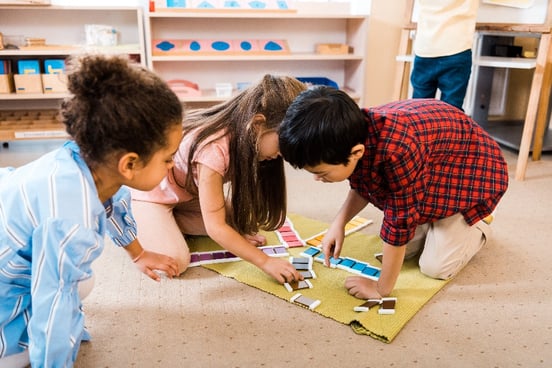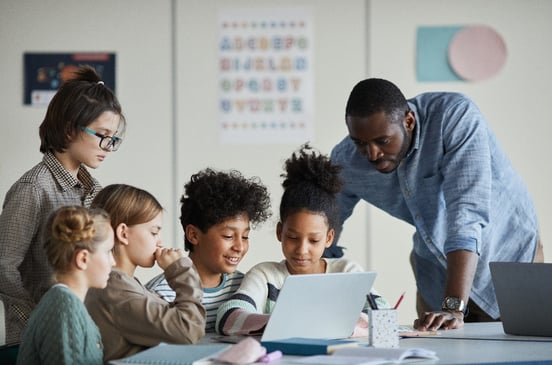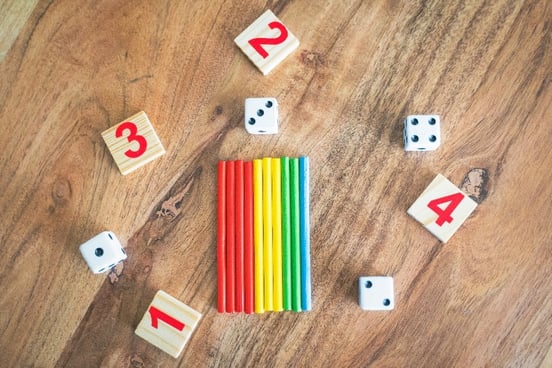ALI Staff | Published May 03, 2024
Play is a natural part of early childhood development, making play-based learning a perfect fit for preschool education. This approach supports learning across all developmental areas and builds cognitive, emotional, social, and physical skills.
In this blog, we take a closer look at:
Let’s explore how play can be a powerful educational tool in preschool environments.

Play-based learning is an educational approach that uses play as the primary mode for teaching and development. This is based on the idea that play is a key way that young learners understand their world. By engaging in play, they can try new things, figure out problems, and get to know new ideas.
Here are the key features of this approach:
Traditional educational methods can be more structured, often led by lesson plans that have specific goals and are teacher-directed. While these plans provide order, they may not always allow for the flexibility that young learners need to follow their curiosity.
Play is more than just having fun for children; it's a vital part of how they learn and grow. Here’s a closer look at the various benefits that play provides across different areas of development:
Play brings many benefits to preschool students. Through play, children build crucial skills and social connections that will support their growth and learning well into the future. It's an essential part of their early education, setting them up for success beyond the classroom.
Now that we've seen how important play is to learning in preschool, here are the best ways to weave play into the daily routine:
Ready to tap into student imaginations? Story-based tools like Kide Science use playful inquiry to connect students to science, math, literacy, and social-emotional concepts in an engaging way. Captivate learners with ready-made lesson plans for your classroom!
By embedding these strategies into your classroom routine, play turns into a powerful tool that supports all areas of child development.
Many educators agree that play is a critical aspect of learning.
However, there remain many gaps and questions about how to incorporate play into learning in the most effective way and how play actually helps children learn more.
A Finnish study co-led by cofounder and lead researcher of Kide Science, Dr. Jenni Vartiainen, explored how to best integrate play into science education. Here are some key insights from this research.
The study found that imagination was crucial for children being able to learn through play.
For example, preschoolers would take regular items like blocks and pretend they were molecules in a science experiment.
This creative play helped them understand complex science ideas by making them real and easier to grasp.
As the activities evolved, children also used accessories like goggles and lab coats to extend and sustain their play scenarios.
This not only deepened their engagement in the science activities but also solidified their understanding of scientific roles and concepts.
The study shows that using imagination helps children learn better, encouraging them to explore and really understand the world. It proves that play is a great way to get kids excited about learning, making difficult concepts simpler and more fun.
To maximize learning for preschoolers, including an aspect of emotional engagement was important. This was done by introducing a relatable character during play-based activities.
For example, when the character needed help to inflate balloons as part of a science experiment, the children were eager to assist.
This situation sparked their curiosity and motivated them to engage in problem-solving, using baking soda and vinegar to generate gas for the balloons.
An emotional connection not only made the activities more compelling but also helped the children grasp the scientific concept of chemical reactions effectively.
Engaging children emotionally through characters they care about enhances their motivation and deepens their involvement in the educational process.
Open-ended experiments are essential for sparking curiosity and fostering self-guided exploration in young learners.
In these activities, children are presented with a scenario and a set of materials but no fixed instructions on how to use them.
This method encourages them to explore, experiment, and discover outcomes on their own, promoting critical thinking and problem-solving skills.
For example, in this study, children were given materials like baking soda and vinegar and asked to explore what happens when these substances mix.
They investigated how the reaction could inflate balloons, learning about chemical reactions through hands-on experimentation.
This approach empowers children to take ownership of their learning process and effectively meets inquiry goals in early childhood science education, helping them grasp complex ideas and build confidence.
Although this study uncovered many intriguing aspects of play-based learning, there's still more to explore.
Here are some areas for future research: understanding how scientific play develops as children grow and assessing the role of digital tools in enhancing or disrupting this learning process.
Play-based learning is essential for nurturing curious and creative minds. It blends discovery with fun, preparing children for future challenges through imaginative play and practical experiments.
Let’s keep pushing for play as a core part of early education, encouraging young learners to explore and grow.

Play is a natural part of early childhood development, making play-based learning a perfect fit for preschool...

At the start of the school year, teachers have the chance to create a math classroom where every student feels valued...

Math manipulatives are a great way to make math more accessible for your students, especially if you know they may...